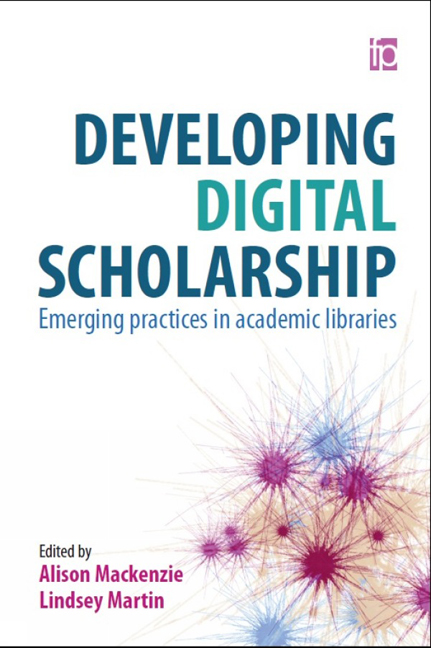Introduction
Published online by Cambridge University Press: 08 June 2018
Summary
Digital scholarship is an incredibly awkward term that people have come up with to describe a complex group of developments. The phrase is really, at some basic level, nonsensical. After all, scholarship is scholarship.
(Lynch, 2014)This is Clifford Lynch's response to the question ‘how would you define digital scholarship?’
His response echoes in part our experiences when we started to examine how digital scholarship is interpreted. Scholarship is a dynamic concept, influenced by the demands of the environment it finds itself in, the ongoing debate about what it means to be a scholar in practice and what support and advice are needed by the digital scholar. There are no easy answers to this question but we aim to offer readers, through a collection of contrasting perspectives, contexts, insights and case studies, an exploration of the relationships between digital scholarship, contemporary academic libraries and professional practice. This will appeal to a readership from across the globe: practitioners, both academic librarians and managers; specialists in archives, special collections or learning technology; students, researchers and tutors of library and information science. Digital scholarship is arguably transformative and this timely publication will provide readers with insights into the changing behaviours of both scholars and librarians as they adapt to the impact that a digital environment has on skills, services, processes and systems.
Background
Toward the end of the last century a more inclusive view of scholarship emerged following Ernest Boyer's influential Scholarship Reconsidered: priorities of the professoriate, which recognized that knowledge is not only acquired through research but encompasses the full scope of academic work ‘through synthesis, through practice, and through teaching’ (1990, 24). Melanie Schlosser, digital publishing librarian at Ohio State University Libraries, has defined digital scholarship as ‘research and teaching that is made possible by digital technologies, or that takes advantage of them to ask and answer questions in new ways’. In summary, it is perhaps a generalization but nonetheless true that 21st-century scholarship will be, by default, digital. ‘It marks a move away from the passive, one-way form of communication from scholar to student or peer or novice. It is a new form of inquiry and practice that generates new questions, new evidence, new conclusions, and new audiences as it is used’ (Ayers, 2012).
- Type
- Chapter
- Information
- Developing Digital ScholarshipEmerging practices in academic libraries, pp. xiii - xxPublisher: FacetPrint publication year: 2016



